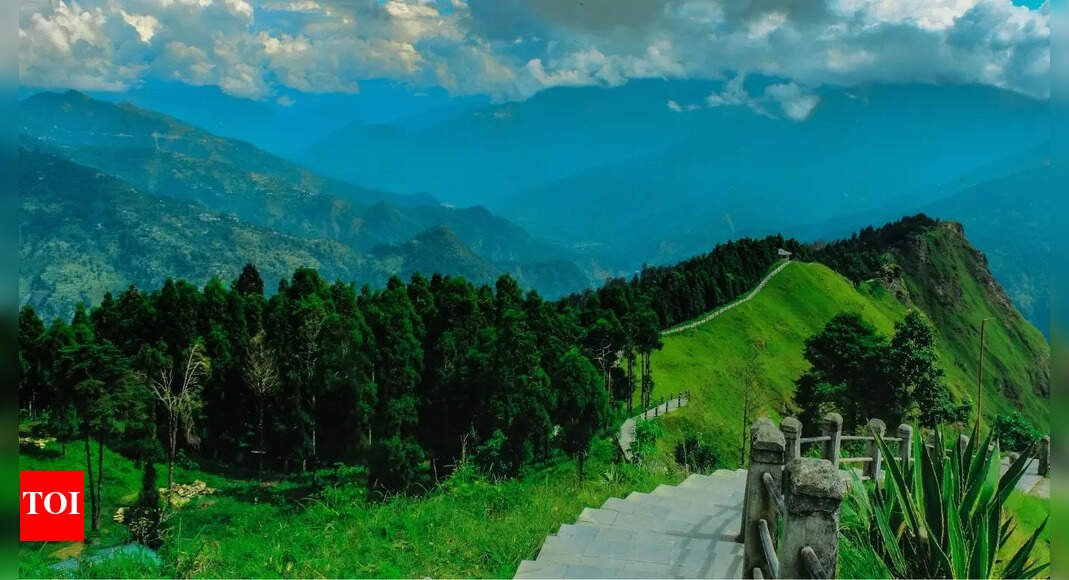Travel Guides & Articles
The Imperative of Sustainable Travel, ETTravelWorld

India’s tourism industry is rebounding. There is undoubtedly hope in the travel and hospitality sector as a result of the recovery in foreign visitors and the post-pandemic high levels of domestic travel.
If we are to learn anything from the growing overtourism crises in parts of Europe and now Asia, it’s that success in tourism is not measured by numbers alone. What matters more is how we travel, who benefits, and whether our journeys uplift the places and people we visit—or strain them to a breaking point.
The pressure is already being felt in places like Shimla, Leh, Goa, and portions of Kerala in India. Roads are congested, waste disposal systems are overloaded, and residents frequently feel alienated in their own communities during the busiest time of year. This is a warning, not only an annoyance.
Overtourism is about infrastructure under strain, short-term rentals driving up housing prices, fragile ecosystems pushed to the edge, and locals feeling increasingly disconnected from the places they call home. It’s about who tourism serves and who it forgets.
There’s a fundamental truth that not all tourism is created equal. After two decades working in the travel industry, I’ve come to believe that the real question isn’t whether we should travel, but how we can travel better. Better for the people who live in the places we visit. Better for the environment. Better for the travellers themselves.
Some of the most pressing challenges stem from the ways tourism has traditionally been structured. The all-inclusive resort, the big bus tour, the whirlwind tour of bucket-list destinations. These models were largely built for volume and profit, not for positive impact.
There’s also the question of who benefits. In many places, a significant proportion of tourism revenue doesn’t stay in the country. Studies have shown that in destinations like Bali, more than half of tourist spending can “leak” out of the economy due to foreign ownership. In the Caribbean, it can be as high as 80%. That’s a staggering loss for communities who bear the cost of hosting tourists every day.
Some governments and cities are already leading the way. Penang in Malaysia has taken steps to reduce short-term rentals and inconvenience to locals. Others are investing in campaigns to educate tourists on respectful behaviour, basic things like water usage, noise levels, and littering – so that locals and visitors can coexist more harmoniously.
The real question isn’t whether India should continue to promote tourism. It’s how?
We need to shift from chasing volume to prioritising value and impact. This entails pushing unconventional travel destinations, promoting more in-depth and prolonged travel experiences, and reconsidering old-fashioned concepts like mass bus tours and universal resort vacations. These rarely lead to long-term viability, even though they might increase short-term earnings.
The responsible travel could look like:
- Promoting community-led tourism, that ensure economic benefits stay local. It means supporting homestays, cooperatives, and small businesses.
- Government needs to implement regulations around short-term rentals, noise levels, littering, and visitor behavior—something cities like Penang in Malaysia are already doing.
- Travellers must be aware of local customs, avoiding sacred sites when inappropriate, and remembering that destinations are not playgrounds, but homes.
- Traveller should be aware about sustainable tourism that requires infrastructure that supports eco-friendly practices. Whether it’s avoiding single-use plastic in the hills of Himachal or respecting water scarcity in Rajasthan, sustainable tourism requires education and action—both from operators and travellers.
Tour operators, travel companies and even digital platforms have a crucial role to play, by actively design trips around slow travel, that promote lesser-known locations, that collaborate with local communities, and that put people and the planet before profits.
The objective should be progress rather than perfection. Every thoughtful decision we make, like hiring a local guide or opting for an environmentally friendly accommodation, puts us in the right direction
Millions are drawn to India by its natural beauty, rich cultural heritage, and kind people. However, these resources are not limitless. For the environment, for locals, and eventually for the travellers too, the tourism boom might swiftly turn into a bust if deliberate, considerate, and sustainable techniques are not used.
Let’s build a future where travel lifts people up, protects our heritage, and enriches both host and guest. The time to change how we move through the world is now—before it’s too late.
The author is the Managing Director, Asia – Intrepid Travel.
DISCLAIMER: The views expressed are solely of the author and ETTravelWorld.com does not necessarily subscribe to it. ETTravelWorld.com shall not be responsible for any damage caused to any person/organisation directly or indirectly.
Travel Guides & Articles
India’s TBO to acquire Classic Vacations

India based travel distribution platform TBO has agreed to acquire Classic Vacations from Phoenix-based investment firm, The Najafi Companies.
The transaction value is estimated at up to $125 million.
The acquisition brings together TBO’s technology platform and worldwide inventory with Classic Vacations network of luxury travel advisors and suppliers.
Classic Vacations delivered revenue of $111 million and an operating EBITDA of $11.2 million in the fiscal year ended December 31, 2024.
“We’re thrilled to bring Classic Vacations into the TBO family – the company’s longstanding delivery of outstanding services has earned the trust of its more than 10,000 travel advisors in the U.S,” said Gaurav Bhatnagar, TBO’s co-founder and joint managing director.
“Classic Vacations is led by a strong team of experts and will continue as an independent brand.”
“As we start working on integrating Classic Vacations with TBO, we will remain open to similar strategic alliances going forward,” added Ankush Nijhawan, co-founder and co-managing director.
Melissa Krueger, CEO of Classic Vacations, added: “Together, we’re strengthening Classic Vacations’ position as the premier luxury partner in the market while extending our reach onto the global stage.”
Classic Vacations was bought by The Najafi Companies in 2021 from Expedia Group.
Classic Vacations has a large network of high-value travel advisors and deep ties with major American consortia.
It delivers premium service across hotels, air, experiences, car rentals, and travel protection, specializing in bespoke luxury itineraries.
Related News Stories: Partner News – TravelMole
Travel Guides & Articles
Govt allows select minorities to stay in India without passport

The Union Home Ministry on Monday, September 1, issued an order announcing that the government now exempts minority communities, namely, Hindu, Sikh, Buddhist, Jain, Parsi and Christian fleeing religious persecution from Afghanistan, Bangladesh, and Pakistan, who entered the country by December 31, 2024, without requiring valid passports or travel documents.
“A person belonging to a minority community in Afghanistan, Bangladesh and Pakistan, namely, Hindu, Sikh, Buddhist, Jain, Parsi and Christian, who was compelled to seek shelter in India due to religious persecution or fear of religious persecution and entered into India on or before the 31st December, 2024,” read the order from the home ministry.
Interestingly, the order did not name Muslims. This is in line with the BJP-led government’s Citizenship Amendment Act (CAA) that was passed in 2019 to facilitate this. It had le to severe protests from Muslims and other citizens who said the law is discriminatory in nature and that it can also be misused to disenfranchise Muslims in the country.
In fact, over the last few months the central government and BJP-led state governments have been targeting Indian Muslims from West Bengal who were being picked up on false allegations of being Bangladeshi citizens. Several prominent activists including Umar Khalid and Sharjeel Imam are currently in jail having spent nearly five years in prison on charges of inciting riots in Delhi amid the anti-CAA protests.
It was issued as part of a series of directives made public by the Union Home Ministry, under the newly enacted Immigration and Foreigners Act, 2025, which came into effect on Monday, September 1.
The Immigration and Foreigners Bill, 2025, aims to grant the Union government the power to control the entry and exit of individuals into and from India by regulations that outline requirements for travel documents, such as passports, and govern various aspects of foreign nationals’ stay, including visa rules, registration procedures, and other related matters.
Previously, the Citizenship Amendment Act (CAA), which was enforced last year, extended the eligibility for citizenship only to non-Muslim minorities from Afghanistan, Bangladesh, and Pakistan who entered India on or before December 31, 2014.
While the recent directive allows certain individuals to stay in India without documentation if they arrived by December 31, 2024, it doesn’t guarantee citizenship.
In contrast, the 2019 Citizenship Amendment Act offers a path to citizenship for persecuted non-Muslim minorities from Pakistan, Afghanistan, and Bangladesh who entered India before December 2014.
The CAA’s exclusion of Muslims sparked widespread protests and concerns about discrimination, secularism, and potential disenfranchisement.
Travel Guides & Articles
Greenest destinations in India for eco-conscious travellers |

India is a haven for eco-conscious travelers seeking sustainable travel experiences. From lush rainforests to pristine Himalayan valleys, these are the places where natural beauty and responsible tourism go hand in hand. Here is a list of India’s greenest escapes, ideal for travelers who wish to explore and make the most of the outdoors while minimizing their environmental impact.
Mawlynnong, Meghalaya
Known as Asia’s Cleanest Village, Mawlynnong in Meghalaya is a model of sustainable living. Look around you and you will find bamboo dustbins. People do not litter here and they expect the tourists also to respect the village’s ways and not litter. Plastic is banned here. Take out time to explore the living root bridges, and interact with the local community. There are eco-lodges and homestays where visitors can stay, these stays offer authentic experiences.
Thenmala, Kerala
This is India’s first planned eco-tourism destination, Thenmala in Kerala’s Western Ghats offers a sustainable escape amidst evergreen forests. Also known as “Honey Hill,” it features attractions like the Thenmala Dam, Butterfly Safari Park, and Shenduruney Wildlife Sanctuary. For those interested, there are activities like boating, trekking, and rock climbing.
Sikkim
The entire state of Sikkim is a beacon of eco-tourism. Sikkim is recognized for its organic farming and conservation efforts. No wonder, it is also India’s first fully organic state. Sikkim is home to the Khangchendzonga National Park, a UNESCO World Heritage Site, which also boasts diverse flora and fauna, including red pandas and snow leopards. There is no dearth of eco-friendly guesthouses, responsible trekking opportunities, and cultural immersion with Lepcha and Bhutia communities. And last but not least, Sikkim is very clean, thanks to the eco-conscious communities.
Munnar, Kerala
Munnar in Kerala’s Western Ghats, is known for its tea plantations, lush valleys, and biodiversity. It is where you will find the rare Neelakurinji flower and species like the Nilgiri Tahr. Munnar is a great place for those seeking romantic getaways, but it is equally perfect for those seeking adventure activities like trekking and wildlife watching. Eco-resorts and sustainable practices, like waste management and local sourcing, ensure a low environmental footprint.
Spiti Valley, Himachal Pradesh
Monsoon may not be the right time to visit Spiti Valley, but come drier months, Spiti is one of the best in the country. This cold desert in the Himalayas, balances tourism with ecological preservation. Solar-powered homestays and community-based tourism initiatives support local livelihoods while protecting the fragile ecosystem. Travelers can explore ancient monasteries, trek through rugged terrains, and engage with sustainable practices, making Spiti a unique eco-destination. Here, it’s all about green energy and sustainable practices, because the greenery that comes with nature is a bit rare here, thanks to it being a cold desert.
-

 Business5 days ago
Business5 days agoThe Guardian view on Trump and the Fed: independence is no substitute for accountability | Editorial
-
Tools & Platforms3 weeks ago
Building Trust in Military AI Starts with Opening the Black Box – War on the Rocks
-

 Ethics & Policy1 month ago
Ethics & Policy1 month agoSDAIA Supports Saudi Arabia’s Leadership in Shaping Global AI Ethics, Policy, and Research – وكالة الأنباء السعودية
-

 Events & Conferences4 months ago
Events & Conferences4 months agoJourney to 1000 models: Scaling Instagram’s recommendation system
-

 Jobs & Careers2 months ago
Jobs & Careers2 months agoMumbai-based Perplexity Alternative Has 60k+ Users Without Funding
-

 Education2 months ago
Education2 months agoVEX Robotics launches AI-powered classroom robotics system
-

 Funding & Business2 months ago
Funding & Business2 months agoKayak and Expedia race to build AI travel agents that turn social posts into itineraries
-

 Podcasts & Talks2 months ago
Podcasts & Talks2 months agoHappy 4th of July! 🎆 Made with Veo 3 in Gemini
-

 Podcasts & Talks2 months ago
Podcasts & Talks2 months agoOpenAI 🤝 @teamganassi
-

 Education2 months ago
Education2 months agoAERDF highlights the latest PreK-12 discoveries and inventions



















